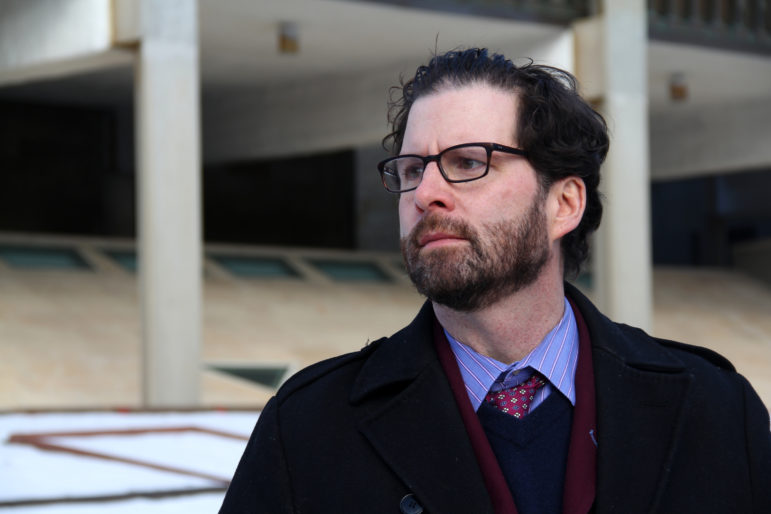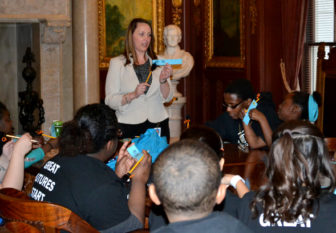State One of Worst for Whistle Blowers
GOP’s repeal of False Claims Act a “green light” to steal from taxpayers?

Gov. Scott Walker’s office says his efforts to end waste, fraud and abuse in state government have saved taxpayers an estimated $150 million in Medicaid and FoodShare alone. But a Wisconsin Center for Investigative Journalism investigation shows that some tools for fighting waste, fraud and abuse have been weakened in recent years by actions of political leaders and state Supreme Court justices. Walker is seen here at the State of the State address on Jan. 10. Photo by Coburn Dukehart/Wisconsin Center for Investigative Journalism.
Republican Gov. Scott Walker’s attack on waste, fraud and abuse has recouped or prevented an estimated $150 million in misspent Medicaid and FoodShare benefits for Wisconsin taxpayers, the governor’s office says. Under Walker, Wisconsin has sharply increased the resources devoted to ferreting out misuse of taxpayers’ money. When he took office in 2011, there was one inspector devoted to finding fraud in Medicaid and food assistance programs; now there are two dozen.
“When people abuse the system, they’re stealing taxpayer-funded resources and putting the programs at risk for those who truly need them,” Walker said during a July tour touting his anti-fraud effort.
But behind that tough rhetoric, some tools for fighting waste, fraud and abuse in state spending have been weakened in recent years by actions of political leaders and state Supreme Court justices, according to a six-month investigation by the Wisconsin Center for Investigative Journalism.
The Center found that whistleblowers — the most effective tool for rooting out waste, fraud and abuse — have been sidelined in Wisconsin by court rulings that make it nearly impossible for them to get protection from retaliation.

Stephen Kohn, an attorney and the head of the Washington, D.C.-based National Whistleblower Center, said Wisconsin is one of the worst states for whistleblowing, noting whistleblowers have been hindered by the repeal of the state’s False Claims Act. Photo courtesy of Leslie Rose.
In addition, at the urging of big business interests, the Legislature in the 2015-17 budget quietly killed the state False Claims Act, a law that had provided lucrative incentives for whistleblowers to report Medicaid fraud. That move and other actions by the Walker administration have cost taxpayers an estimated $11 million so far in reduced fraud settlements.
Because of that repeal, “Wisconsin now has the honor of being one of the worst states for whistleblowing,” said Stephen Kohn, an attorney and the head of the Washington, D.C.-based National Whistleblower Center, a legal advocacy association for whistleblowers.
Other highlights of the Center’s findings, unveiled beginning today in a series called Broken Whistle, include disparities in how alleged wrongdoing is handled:
— Walker’s anti-waste initiative has made it more difficult for people to qualify for and keep public benefits. Removals from the FoodShare program are up sixfold since 2012; one in five unemployment insurance claims is now denied, up sharply since 2011; and appeals of worker’s compensation decisions are up more than 64 percent since Walker took office.
— Some companies that default on taxpayer-financed loans or grants from the Wisconsin Economic Development Corp., and fail to create promised jobs, are allowed to repay the state a fraction of the amount owed. For example, the state has agreed to settle four unpaid loans totaling $1.8 million for $224,000 — or about 12 cents on the dollar.
— Family planning clinics have been repeatedly targeted by the Walker administration for allegedly misspending millions in Medicaid dollars, an effort providers say has been “politicized” and which ultimately resulted in the state agreeing to reduce the amount to be recouped by 93 percent.
— The Walker administration has attempted to recover sums in excess of $100,000 from individuals who provided Medicaid home medical and personal care services but whose paperwork did not meet the state’s “perfection rule” requiring complete adherence to every rule. Two judges have currently stayed the state’s efforts to collect from these individuals.
‘Green light to steal’
Whistleblowers are employees who report wrongdoing or abuse, most often within the very agency or company in which they work. They can be polarizing figures, especially among their managers and in their own workplaces.

Employees at the Lincoln Hills and Copper Lake School juvenile prisons charged that the Department of Corrections had disbanded its internal affairs unit because they did their jobs too well. Photo by Dan Young / USA TODAY NETWORK-Wisconsin.
Just last week, the Milwaukee Journal Sentinel reported that corrections employees alleged they were retaliated against after helping uncover abuse of inmates at Lincoln Hills and Copper Lake juvenile prisons. In a document obtained by the newspaper, the employees charged that the Department of Corrections had disbanded its internal affairs unit because they did their jobs too well. Corrections officials said it was part of a restructuring to maximize the agency’s investigative resources.
Wisconsin law bars retaliation against state employees who identify waste, fraud and abuse. But a review of the 161 whistleblower complaints filed since 2003 shows such workers rarely prevail when they allege retaliation. The Department of Workforce Development’s Equal Rights Division found discrimination in just two cases.
Whistleblowers are the No. 1 method for identifying waste, fraud and abuse in government and in the private sector, according to the Association of Certified Fraud Examiners, which calls itself the world’s largest anti-fraud organization. The group estimates 40 percent of misspending is caught because of tips from whistleblowers — vastly outstripping any other source, including internal and external audits and management reviews, according to the group’s 2016 Global Fraud Study.
Kohn, who has represented whistleblowers for 30 years, said repealing the False Claims Act was “a green light for people to steal from the Wisconsin taxpayers.”
“The False Claims Act is the No. 1 law for detecting fraud in government contracts,” Kohn said. “Every single government official who has reviewed it has confirmed that fact.”
The whistleblower program also has suffered from a lack of transparency. The DWD discovered in early 2015 that it had failed to file summary reports on whistleblower cases — a long-ignored requirement that had been in place since 2003.
Retaliation complaints rarely win

Dan Bethards was an undercover drug agent who brought allegations against former Division of Criminal Investigation Special Agent in Charge Jay Smith to state and federal authorities. He was fired in October 2013 for allegedly violating several Department of Justice rules. Bethards claims he was the victim of whistleblower retaliation. Photo by Coburn Dukehart / Wisconsin Center for Investigative Journalism.
While state employee whistleblowers are supposed to be protected from retaliation, as Dan Bethards’ case demonstrates, the law does not always work that way.
Bethards, a former Department of Justice employee, blew the whistle in 2012 on a supervisor who was manufacturing and selling firearms without a license. Bethards was fired and, according to his complaints against the agency, DOJ officials ruined his reputation in law enforcement by branding him a liar.
Since reporting his supervisor, Bethards — a 25-year law enforcement veteran and former special agent with the state’s top law enforcement agency — has struggled to find employment. He lost his home to foreclosure. Although his report prompted a criminal investigation that confirmed his boss was making and selling guns, federal authorities declined to prosecute. That supervisor continues to work at DOJ.
Said Bethards: “They totally destroyed me.”
Since 2003, Wisconsin state employees, including Bethards, have filed 161 complaints alleging retaliation. Most of those whistleblower complaints were dismissed or withdrawn after a finding of no probable cause or other problems with the complaint, according to case outcomes provided by the agency.
In 42 cases, agencies involved in the alleged retaliation agreed to settlements in which the state generally denied fault. Some of those settlements compensated whistleblowers with back pay, reinstated employment, allowed for changes to an employee’s personnel file, altered working conditions or covered attorney’s fees.

Dan Bethards had a long career in law enforcement and the military, including serving in the Iraq War, before he became a Department of Justice whistleblower in 2012. Photo courtesy of Dan Bethards.
Eleven cases were decided in circuit or appellate courts. Whistleblowers were unsuccessful in all of them, the Center found. In each case, courts either found no illegal retaliation or ruled that the whistleblower failed to follow specific guidelines or provide information that qualified them for whistleblower protection.
As of late September, seven whistleblower cases were still pending resolution.
When informed of the Center’s findings, DWD spokesman John Dipko responded that the state whistleblower law “provides important protections for employees who report suspected wrongdoing, while sending a message to all state employees regardless of title or rank that workplace retaliation against those individuals is illegal.”
He added, “Employees aren’t discouraged from reporting suspected wrongdoing, which is the ultimate goal of the whistleblower protection law.”
For Bethards, the fight is over. In May, the Wisconsin Court of Appeals sided against him on technical grounds in a ruling that also could make it more difficult for other whistleblowers to prevail. Bethards said he has no plans to appeal.
UW settles, but whistleblower still suffers
During the 2015-16 biennium, the state paid settlements to eight whistleblowers totaling $165,000, with individual amounts ranging from $4,500 to $50,000. Seven were given cash payments and one was compensated with an unspecified amount of paid administrative leave up to the date of his resignation.
The settlements are often conditional on the whistleblower withdrawing his or her complaint and signing a confidentiality agreement.
Roughly one-third of that total was paid in one settlement. Candice Hemmerling, who filed a retaliation complaint against the University of Wisconsin Colleges, received $50,000, about four years after she filed a 2012 retaliation complaint.
Hemmerling said UW Colleges took action against her after she alleged financial mismanagement and inappropriate conduct within the federally funded Upward Bound program. Hemmerling’s allegations ultimately were verified, and the UW shut down the program for prospective first-generation college students, which officials had moved without federal authorization from UW-Sheboygan to UW-Manitowoc.
Throughout the two years following her reports, Hemmerling’s contract was not renewed, she was demoted, and her position was eventually eliminated, according to her complaint.
Much like Bethards, Hemmerling struggled to hold steady employment after the state let her go. She declined to be interviewed for this report. But a 2014 Wisconsin Gazette article on poverty shed light on Hemmerling’s situation as a Wisconsinite struggling to find work.
“I have exhausted my retirement, my savings, and my unemployment has ended,” Hemmerling told the Milwaukee-based newspaper.
Whistleblower report missing for years
The 2015-16 state whistleblower report is the first of its kind, although the DWD has been legally required to produce one every biennium since 2003.
The 2015 preliminary report, with data going back to 2003, acknowledges the agency failed to produce the required reports. The document goes on to attribute the 12-year lapse in documentation to the dissolution of the Personnel Commission in 2003.
When the commission was dissolved, its duties “were divided between the Equal Rights Division … and the Wisconsin Employment Relations Commission,” according to the Commission’s website.
“Regrettably, this matter did not come to DWD’s attention until this week,” says the document, dated Feb. 25, 2015.
Whistleblower law ‘meaningless’
While the Walker administration has vowed to eliminate waste, fraud and abuse in state government, a state Supreme Court’s 2015 decision has created a disincentive for state employees to participate, rendering the Whistleblower Law “essentially meaningless,” according to Peter Fox, the attorney who lost that case.

Peter J. Fox is a Milwaukee attorney who specializes in employment law, including representing whistleblowers who allege retaliation under Wisconsin’s whistleblower law. Photo by Alexandra Hall / WPR/Wisconsin Center for Investigative Journalism.
In 2008, Fox’s client, Joell Schigur, then a state DOJ manager, alerted her supervisor to potential conflicts between state law and the agency’s plan to use government funds to provide personal security for then-Attorney General J.B. Van Hollen at that year’s Republican National Convention.
Schigur, who had received positive quarterly reviews for two years prior to raising concerns, was promptly demoted to special agent-in-charge. She sued for alleged illegal retaliation under the whistleblower law.

Division of Criminal Investigation Special Agent Joell Schigur speaks to a group from the Boys & Girls Club of Dane County at the State Capitol in 2013. Schigur sued the Department of Justice for alleged illegal retaliation under the whistleblower law, but lost her case at the state Supreme Court in 2015. Photo from the Wisconsin Department of Justice.
Fox argued Schigur’s case all the way up to the state Supreme Court. It sided with the DOJ, ruling that Schigur had only expressed an “opinion” of wrongdoing to her supervisor — information her supervisor already had. Thus, Schigur was not entitled to protection from retaliation.
Fox said future whistleblowers, who already face a “lonely, lonely journey,” might be less likely to receive protection from retaliation due to the ruling and the current political climate.
“If this (case) doesn’t get protection, I don’t know what will,” Fox said.
In a dissenting opinion, Supreme Court justices Ann Walsh Bradley and Shirley Abrahamson wrote that the court’s decision may have a chilling effect on whistleblowers.
“The consequences of this decision may be far reaching,” Bradley wrote. “Not only will whistleblowers suffer retaliation without recourse, but all of Wisconsin’s citizens lose protection against government corruption. Absent legal protections, it will be the rare employee who will risk her livelihood to act as a whistleblower.”
Student journalists Peter Coutu and Julie Spitzer, and Wisconsin Center for Investigative Journalism staff members Cara Lombardo and Dee J. Hall contributed to this report. This story was produced as part of an investigative reporting class in the University of Wisconsin-Madison School of Journalism and Mass Communication under the direction of Hall, the Center’s managing editor. The nonprofit Center (www.WisconsinWatch.org) collaborates with Wisconsin Public Radio, Wisconsin Public Television, other news media and the UW-Madison School of Journalism and Mass Communication. All works created, published, posted or disseminated by the Center do not necessarily reflect the views or opinions of UW-Madison or any of its affiliates.
Broken Whistle
-
Doctors Side Against Injured Public Workers?
 Jan 21st, 2018 by Alexandra Hall and Dee J. Hall
Jan 21st, 2018 by Alexandra Hall and Dee J. Hall
-
Did State Retaliate Against Whistleblowers?
 Dec 5th, 2017 by Leo Vartorella
Dec 5th, 2017 by Leo Vartorella
-
Court Ruling Weakens Whistleblower Law
 Dec 4th, 2017 by Bobby Ehrlich
Dec 4th, 2017 by Bobby Ehrlich


















